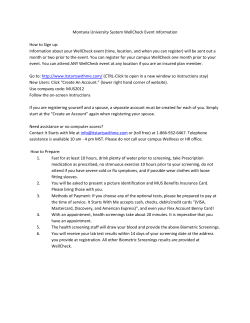
Englsih PDF here - GEC-KO
NON-INVASIVE PRENATAL TESTING Non-Invasive Prenatal Testing (NIPT) is a screening test to prenatally detect Down syndrome and other aneuploidies. NIPT assesses fragments of cell-free DNA (cfDNA) that are circulating in maternal blood to determine if there is an increased chance that the fetus has aneuploidy. NIPT should be considered in pregnancies at increased risk of aneuploidy. NIPT has higher sensitivity and specificity for Down syndrome (trisomy 21) and trisomy 18 than current screening tests – First Trimester Screening (FTS)/Integrated Prenatal Screening (IPS)/ Maternal Serum Screening (MSS) - however it is not considered to be diagnostic. Positive results should be confirmed by diagnostic testing (amniocentesis or chorionic villus sampling) prior to any irrevocable action. Negative results may indicate additional follow-up testing and consultation. Women who do not meet criteria can pay for NIPT themselves. Price varies by company (795$-1,200$). WHAT IS NON-INVASIVE PRENATAL TESTING? Non-invasive prenatal testing (NIPT) is a highly sensitive and specific way to screen for particular chromosome aneuploidies (an abnormal chromosome number (extra or missing)), in particular trisomies 13, 18 and 21/Down syndrome. NIPT can also be used for sex chromosome identification for the purpose of fetal sex determination where there is increased risk for an X-linked disorder or a sex chromosome abnormality. NIPT assesses fragments of cell-free DNA (cfDNA) derived from the placenta that are circulating in maternal blood and represent the fetal genetic profile. CfDNA from the pregnancy comprises approximately 10% of DNA in maternal blood and the amount increases with gestational age. Companies offering NIPT use various technologies to analyze cfDNA. Some detect higher relative amounts of DNA from an aneuploid fetus by comparing quantity to a reference chromosome, determining if there is a normal, higher or lower than expected quantity of particular DNA sequences found on select chromosomes (13, 18, 21, X, Y). Others sequence and analyse single-nucleotide polymorphisms (SNPs) to differentiate between maternal and fetal genotypes. NIPT is a non-invasive test performed on a maternal blood sample that poses no risk to pregnancy. Testing can be carried out as early as 9 weeks gestation. A dating ultrasound is recommended prior to drawing the blood sample to ensure viability, obtain an accurate gestational age, and to exclude multiple pregnancies. NIPT validation studies in high risk populations have demonstrated high pick-up rates/sensitivity for the detection of Down syndrome (sensitivity 99-100 %), trisomy 18 (sensitivity 97-100%), trisomy 13 (sensitivity 79-92%) and sex chromosome differences. False positive rates are reported to be less than 2% overall. Early studies suggest that the positive predictive value (PPV) of NIPT in an unselected, general obstetrical population (low risk) is about 45% for Down syndrome (versus about 4% for standard screening) and about 40% for trisomy 18 (versus about 8% for standard screening). The PPV appears to be significantly higher in high risk populations. A number of women (<6%) have required a repeat blood draw due to initial test failure. Most studies have commercial affiliations. At the present time, it is recommended that all women under age 40 at estimated date of birth (EDB) be offered prenatal screening, using FTS, IPS or MSS. If a woman is screen positive, NIPT may be considered as a secondary screen of higher sensitivity. Women 40 years or older at EDB can be offered NIPT as a first screen for aneuploidy. NIPT is not a replacement for diagnostic prenatal testing. A positive NIPT result should be confirmed by diagnostic testing (amniocentesis or chorionic villus sampling [CVS]) prior to any irrevocable action. The expected benefit of NIPT will be fewer women undergoing secondary invasive diagnostic tests associated with a risk of pregnancy loss. NIPT is ordered by a healthcare professional. Some genetics centres are counselling patients about this testing option, and some are also organizing testing for patients who have been referred because of a high risk indication. All patients should have pre- and post-test counselling to ensure informed decision making and follow-up. www.geneticseducation.ca | @GECKOgenetics Reviewed April 2015 Page 1 of 3 RED FLAGS TO CONSIDER TESTING OR GENETIC CONSULTATION NIPT has been validated for use in women determined to be at high risk of having a fetus with certain aneuploidies (trisomy 13, 18, 21 and X and Y detection). Consider discussing NIPT as an option for women who: Are of advanced maternal age, defined as 40 years of age or older at EDB Have an abnormal serum screen i.e. FTS/IPS/MSS Have a fetal nuchal translucency (NT) measurement of 3.5mm or greater Have had a previous pregnancy or child with aneuploidy Have fetal congenital anomalies on ultrasound highly suggestive of trisomy 13, 18 or 21 Have soft markers on ultrasound which are highly suggestive of aneuploidy [Refer to SOGC guidelines, 2005]. Are at risk of carrying a male fetus with an X-linked condition (NIPT would be used for sex determination) As each prenatal genetics centre has variable referral criteria and practice, abnormalities seen on ultrasound (e.g. congenital anomalies, NT ≥ 3.5mm or other soft markers) should be discussed with your local genetics centre to decide whether a referral is appropriate, whether NIPT should be offered first, or if additional testing should be considered. WHAT DOES THE TEST RESULT MEAN? Depending on the company, results may be worded as: positive or negative; aneuploidy detected, no aneuploidy detected or aneuploidy suspected/borderline value; or high risk or low risk. Results typically take approximately 8-10 days. If the result is negative, this is reassuring, however NIPT cannot: — detect aneuploidy other than chromosomes 13, 18, 21, X and Y o some companies are now adding screening for other trisomies and certain microdeletion syndromes, addition of these rare conditions to the test increases the false positive rate and decreases the positive predictive value — completely rule out aneuploidy — detect single gene conditions — detect congenital anomalies Your patient should still be offered: — a fetal morphology scan at 18-20 weeks gestation — a referral for genetic and/or maternal fetal medicine consultation, which may be indicated for additional counselling and testing, depending on the reason your patient qualified for NIPT — As per SOGC guidelines, MS-AFP should only be offered to pregnant women with a pre-pregnant body 2 mass index ≥ 35 kg/m or when geographical or clinical access factors limit timely and good quality ultrasound screening If the result is positive, follow-up genetic counselling is indicated and confirmation by diagnostic testing should be offered. The SOGC and numerous North American Genetics societies/colleges recommend that no irrevocable obstetrical decisions should be made in pregnancies with abnormal NIPT results without confirmatory invasive testing (amniocentesis or CVS) as false positive results do occur. Important pre- and post- test counselling considerations around a positive result are: — While a highly sensitive and specific screen, the likelihood that a positive aneuploidy result is truly positive for an aneuploidy other than Down syndrome is low (e.g. trisomy 13, a sex chromosome aneuploidy) (<60%). Data are still emerging on the positive predictive value of NIPT. — NIPT screens for more than one condition and it is possible to receive an incidental finding. For example, the test could be ordered because of an increased fetal risk for Down syndrome and the report could indicate suspicion of another chromosome abnormality, e.g. suspected sex chromosome aneuploidy, like Turner syndrome (45,X) or Klinefelter syndrome (47,XXY). www.geneticseducation.ca | @GECKOgenetics Reviewed April 2015 Page 2 of 3 For a recent review on NIPT see Cuckle H, et al, Cell-free DNA screening for fetal aneuploidy as a clinical service, Clin Biochem (2015), http://dx.doi.org/10.1016/j.clinbiochem.2015.02.011 Authors: S Morrison MS CGC, CM Armour MSc MD FRCPC, JE Allanson MD FRCPC and JC Carroll MD CCFP GEC-KO on the run is for educational purposes only and should not be used as a substitute for clinical judgement. GEC-KO aims to aid the practicing clinician by providing informed opinions regarding genetic services that have been developed in a rigorous and evidence-based manner. Physicians must use their own clinical judgement in addition to published articles and the information presented herein. GEC-KO assumes no responsibility or liability resulting from the use of information contained herein. www.geneticseducation.ca | @GECKOgenetics Reviewed April 2015 Page 3 of 3
© Copyright 2025












